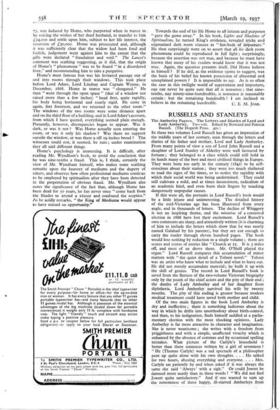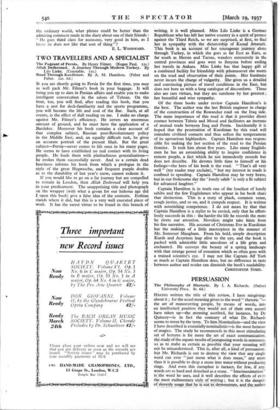RUSSELLS AND STANLEYS
IN these two volumes Lord Russell has given an impression of the middle years of last century, seen through the letters and diaries of his father and mother, Lord and Lady Amberley. From many points of view a son of Lord John Russell and a daughter of Lord Stanley of Alderley were well favoured by fortune ; they belonged to a class which could still hold in its hands many of the best and most civilised things in Europe. They were born too early in the century (1842) to be self- conscious about their station ; they were too much sheltered to read the signs of the times, or to notice the rapidity with which their social world was being undermined. They could still cultivate a mild, and at times inconsistent, radicalism of an academic kind, and even burn their fingers by touching dangerously unpopular causes.
If this were all, the portraits in Lord Russell's book would be a little jejune and uninteresting. The detailed history of the mid-Victorian age has been illustrated from every angle, and in thousands of letters. The decline of Whiggery is not an inspiring theme, and the minutiae of a contested election in z868 have lost their excitement. Lord Russell's own comments are sharp, and attractively written (it is charming of him to include the letters which show that he was nearly named Galahad by his parents), but they are not enough to carry the reader through eleven hundred pages. The book would lose nothing by reduction to a single volume ; there are scores and scores of entries like "Church at 12. It is 3 miles off, and most of us drove there. Mr. O'Neill played the organ." Lord Russell compares this accumulation of minor matters with "the quiet detail of a Tolstoi novel." Tolstoi was an artist who knew what to include and what to leave out. He did not merely accumulate material; he built it up with the skill of genius. The record in Lord Russell's book is saved from the flatness of the two-volume Victorian biography only by the youth of the chief actors and the pity of their end ; the deaths of Lady Amberley and of her daughter from diphtheria. Lord Amberley survived his wife by twenty months. The pity of this ending is greater because modern medical treatment could have saved both mother and child.
Of the two main figures in the book Lord Amberley is dry and ineffective ; there is something ludicrous about the way in which he drifts into unorthodoxy about birth-control, and then, to his indignation, finds himself saddled at a parlia- mentary election with the most shocking opinions. Lady Amberley is far more attractive in character and imagination. She is never wearisome ; she writes with a freedom from priggishness and with a simple, unaffected vivacity which is enhanced by the absence of commas and by occasional spelling mistakes. What picture of the Carlyle's household is better than these sentences written by a girl of seventeen ? "He (Thomas Carlyle) was a sad spectacle of a philosopher pent up quite alone with his own thoughts. . . . He, talked for two hours, abusing everything and everyone. . . . Mrs. Carlyle sat patiently by and when asked if it was always the same she said ' Always ' with a sigh." Or could Jowett be damned more neatly than in these words ! "We did not find Jowett quite sattisfactory." And if one wanted to sum up the remoteness of these happy, ill-starred Amberleys from the ordinary world, what phrase could be better. than the admiring comment made in the diary about one of their friends : " He goes third class for economy, very good in him, as I kn Dv; he does not like that sort of thing " ?
E. L. WOODWARD.





































































 Previous page
Previous page